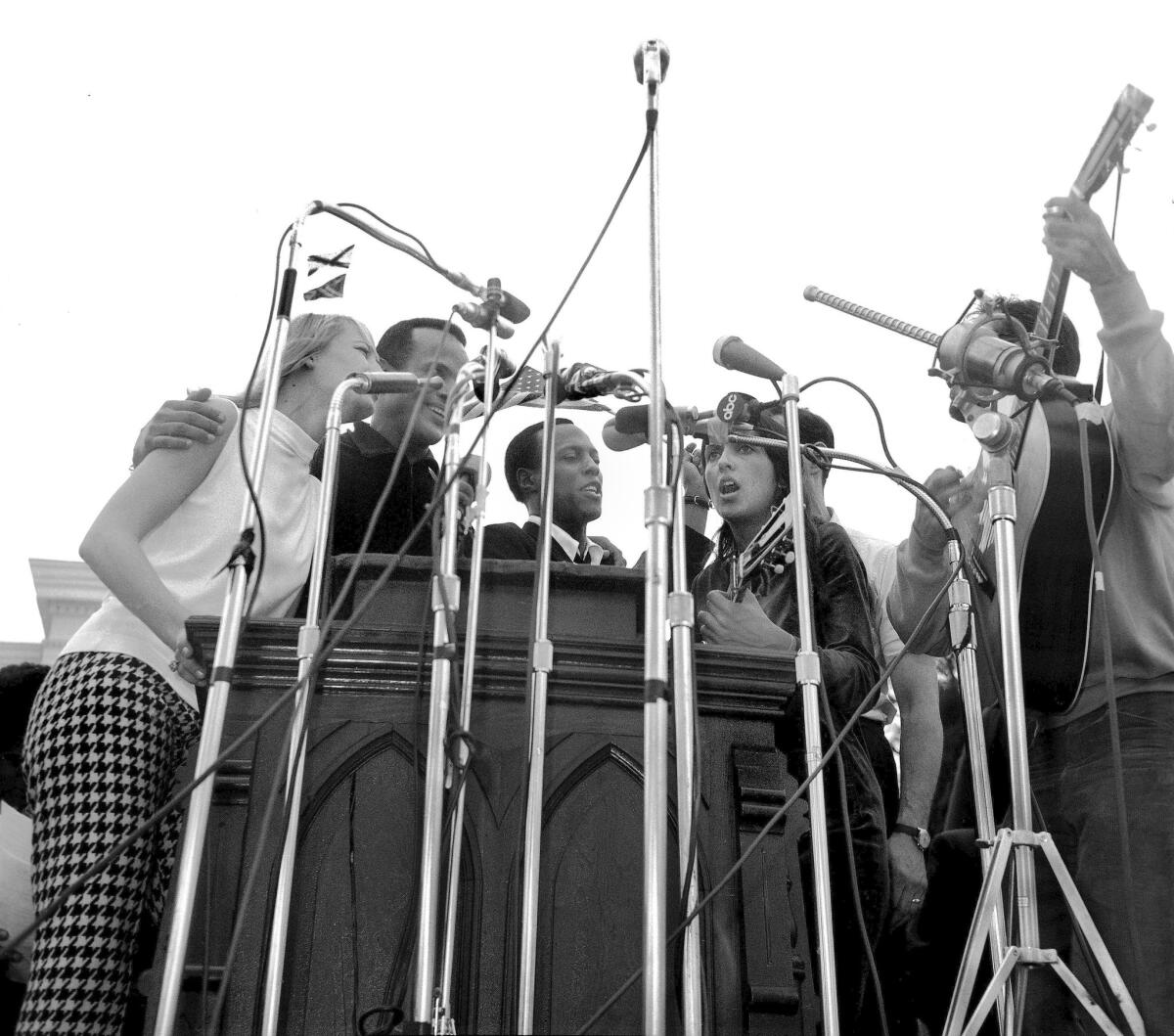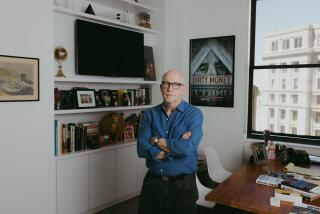Leon Bibb dies at 93; Tony-nominated actor and folk singer

Leon Bibb, center, a stirring baritone who learned to sing in church choirs, performs with (from left) Mary Travers, Harry Belafonte, Joan Baez and Oscar Brand at the 1965 march from Selma to Montgomery, Ala.
- Share via
Leon Bibb, a Tony-nominated actor and folk singer who grew up under segregation, found mainstream favor on the “The Ed Sullivan Show” and sang with Joan Baez and Harry Belafonte on the civil rights trail, has died at 93.
A stirring baritone who learned to sing in church choirs, Bibb made his Broadway debut in 1946 in the chorus of “Annie Get Your Gun,” with Ethel Merman. He earned a Tony nomination in 1967 for his performance in “A Hand Is on the Gate,” which featured poetry and music by African Americans.
In 1968 Bibb drew attention when he was cast opposite Victoria Mallory, a white actress, in an off-Broadway revival of the musical “Carnival.”
It was the first time the show had been presented as an interracial love story.
“People may be attracted to the interracial love in the play,” the handsome leading man told the New York Times in 1968. “I don’t knock it — but it isn’t the most important thing. To cast black actors in roles where they can bring an extra dimension to the story is important.”
Bibb, who died Oct. 23 in his adopted hometown of Vancouver, Canada, had been in declining health since a stroke last year, said his daughter, Dorie Clay.
He was a beloved figure in Vancouver, where he staged a long-running production of “Jacques Brel is Alive and Well and Living in Paris.” He performed in schools across Canada as part of an anti-racism program he founded in the 1990s.
His involvement in education brought him such honors as the Order of British Columbia in 2009.
“People think there is no racism in Canada, but there is,” said Bill Sample, Bibb’s longtime music director and producer, who accompanied Bibb on the school tours. “He enabled a lot of kids to open up because he would talk about his own struggles with racism.”
The son of a postal worker, Charles Leon Aurthello Bibb was born in Louisville, Ky., on Feb. 7, 1922.
Until he was 19, “I never had a conversation with a white person,” he recalled in a 2011 commencement speech at the University of British Columbia. “I lived in a community that was pretty much ringed around by the white world. I saw ‘colored’ toilet signs, I saw ‘colored’ fountain signs…. My teachers and my parents sustained me through all of this.”
Bibb left Louisville after college to serve in the Army Air Forces. He had begun to train with the Tuskegee Airmen when he was diagnosed with rheumatic heart disease, which led to his discharge.
After leaving the service, he moved to New York and trained to sing opera, “but there were no roles for African Americans,” his daughter said. He found some opportunities in musicals, however, and during the 1940s and ‘50s was one of the few black actors to appear on Broadway.
He played a waiter in “Annie Get Your Gun” and Jim in “Livin’ the Life,” a musical based on “The Adventures of Huckleberry Finn.” He also toured with “Finian’s Rainbow” and was directed by Elia Kazan in “Flight into Egypt,” with Zero Mostel.
In 1966 he was one of eight black actors, including Cicely Tyson and James Earl Jones, in “A Hand Is on the Gate,” which combined the poetry of such writers as Langston Hughes and Gwendolyn Brooks with Negro spirituals and other songs. It was Bibb’s last Broadway show.
By then, he was firmly established on the folk-singing circuit. “I only moved into folk music because a black actor couldn’t get a job on Broadway,” Bibb said in the New York Times interview.
In 1959 he performed at the first Newport Folk Festival and was signed by Vanguard, which featured him on several albums, including “Leon Bibb Sings Folk Songs.” That year he also made the first of several appearances on “The Ed Sullivan Show.”
Later he was featured on the television show “Hootenanny.” He also made two movies with Sidney Poitier, “For Love of Ivy” (1968) and “The Lost Man” (1969).
He was banned from the Sullivan show in the mid-1960s because of his support of two prominent blacklisted artists, Pete Seeger and Paul Robeson, his role model and the godfather of his children.
When the civil rights movement heated up, Bibb joined Seeger, Bob Dylan, Peter, Paul and Mary and other folk singers at landmark protests, including the 1963 March on Washington.
Two years later he joined the thousands of protesters who marched from Selma to Montgomery, Ala., in support of blacks’ voting rights and performed in Montgomery with Baez, Belafonte, Mary Travers and Oscar Brand.
In 1969 he stopped in Vancouver while touring with Bill Cosby and decided to move there.
“He looked out on the water and the mountains beyond and said, ‘I have to live here,’” Sample said.
He married the former Marylyn Duncan in 1947; they were divorced in 1967. Besides his daughter Dorie, Bib is survived by his son, Eric, a singer and songwriter; another daughter, Amy Bibb-Ford; his partner, Christine Anton; nine grandchildren; and six great-grandchildren.
Twitter: @ewooLATimes
More to Read
Start your day right
Sign up for Essential California for the L.A. Times biggest news, features and recommendations in your inbox six days a week.
You may occasionally receive promotional content from the Los Angeles Times.








